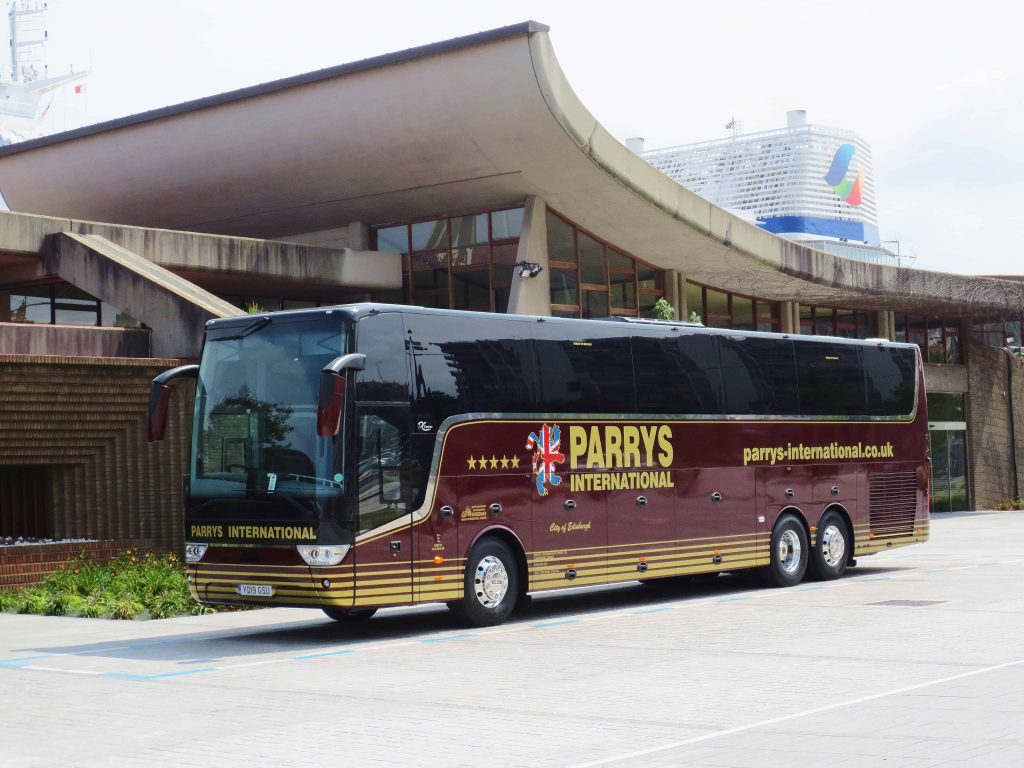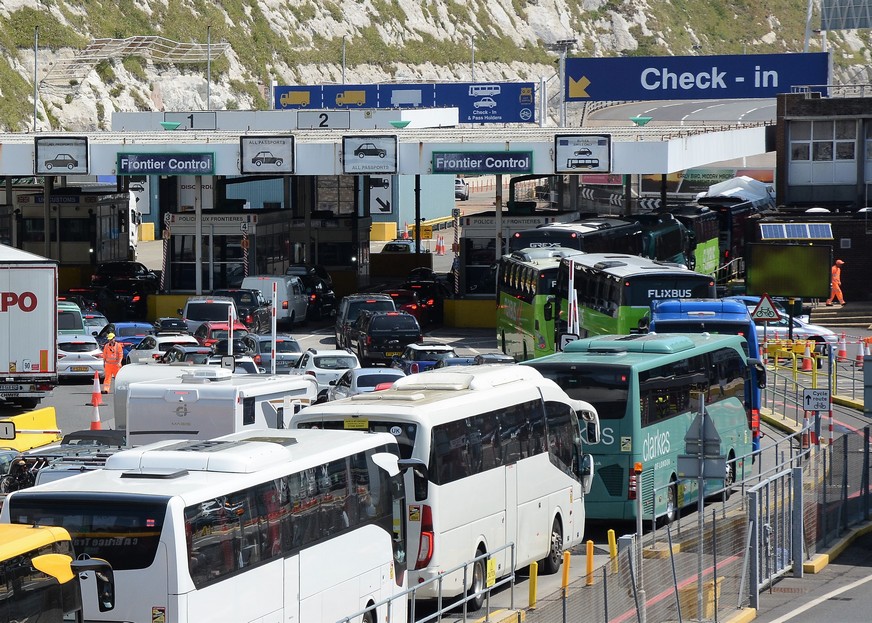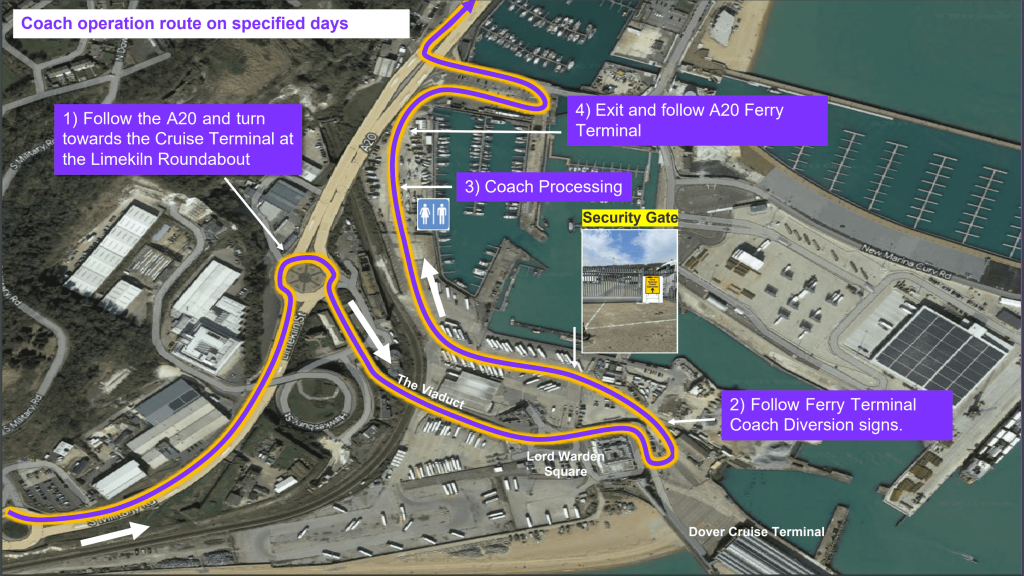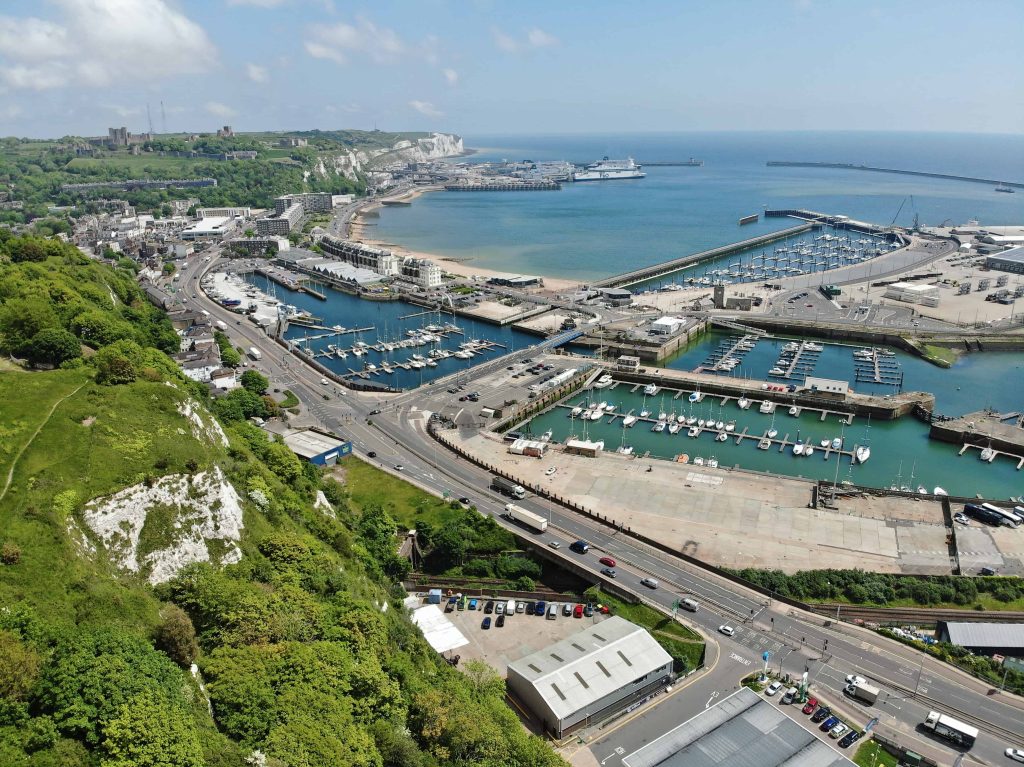The Port of Dover fell under the spotlight once again during the spring bank holiday weekend when long waits and missed ferries brought back memories of the infamous delays experienced by motorists and coach operators in April 2023.
The struggles of 24-26 May were by no means as severe as the 24- hour limbo operators had to endure last year, whose root cause was reportedly a combination of post-Brexit procedural change, reduced processing capacity at the French border and a “false sense of security” following traffic reduction during COVID-19. But the recent news has happened at a delicate time for port authorities and for confidence in continental coach tourism ahead of the summer season.

Shortly before the bank holiday weekend, routeone was given the opportunity to interview Therese West-Moore (pictured), Head of Port Operations at Dover, who explained that port authorities had faith that changes to procedures during peak times, introduced as a direct response to last year’s chaos, would be enough to stop history repeating itself. Some coach operators are not so sure. But while some extra revision has been promised, the new procedures — where coaches are diverted at peak times and forced to rejoin the bulk of traffic after being separately processed in an area called the boatyard — are here to stay, and will become a permanent feature in the EU Entry/Exit Scheme (EES) process anticipated for introduction at the end of 2024.
Recent delays an anomaly?
routeone naturally followed up with the Port following the most recent delays. In summary, it says the procedures are continuing to work well, and that the spring bank holiday weekend caught authorities unawares in an otherwise good system that has been endorsed by the coach industry.
A spokesperson for the Port highlighted that the problems were largely confined to Saturday, with Friday being “busy and successful” and Sunday’s traffic being “effectively handled”. As for Saturday, delays were put down to “a high amount of non-port traffic in the area, along with some port-bound traffic that did not adhere to the plans in place.”
So Dover acknowledges the system isn’t perfect. But the redesigned coach processing method, which sees coaches diverted to the boatyard area at Western Docks during peak periods to reduce strain on border control staff, came under particular scrutiny by Parrys International founder Dave Parry and Johnsons Coaches General Manager Kyran Flynn. They told routeone that the process of being diverted and rejoining traffic to access the Port causes unnecessary delays, particularly for coaches that have undertaken the Advanced Passenger Information (API) process beforehand using the DFDS app.
Regardless, that diversion had to be introduced, according to port authorities, in order to “minimise future risks”. Acknowledging the frustrations experienced by operators, the same spokesperson says the Port of Dover now recognises a need for it to refine its plans with partners, particularly “the hours in which the boatyard is in operation and the traffic management plans that are in place to support the coaches re-joining the traffic heading to the ferry terminal”.
With the strategy being actively reviewed, multi-agency meetings are now taking place on how processes can be improved.

More changes to come ahead of EES
It must be said that authorities at the Port of Dover are open about the issues that led up to the problems experienced in 2023 and are clear about the logic behind the changes made to coach processing. More are yet to come.
“We learned a lot from that Easter and by the summer we more than doubled the capacity at the French border (the number of booths that process coach passengers at the Eastern Docks) and we doubled down on our interaction with the French border control officers, improving the relationship,” says Therese. “The French border has a new management structure in place, and we’ve worked hard to make sure there are the correct number of people on shift to process traffic when it’s needed.
We’re all working towards the same goal: To get people through the border as quickly as possible. As long as everybody is working towards that, it should be a smooth process
“We have daily local meetings with staff, weekly meetings with the management team, and we supply data to say how much traffic is coming, what is expected, how many positions we need open to keep the border flowing. All those processes are in place, and it’s working well.”
Dover says those changes give sufficient throughput to keep the flow of coaches moving at the border. An AI platform in the control room also now gives a one- to 12-hour overview of traffic approaching the port on the strategic network. That allows for better planning around the traffic approaching Dover.
There is also development taking place in anticipation of the introduction of EES; ahead of its launch date on 6 October, two facilities will be built at the Western Docks boatyard, which will then become the French border for coaches. Come launch day, all coaches will be permanently diverted to that facility to undertake border control processes. After passengers complete the EES process and return to the coach, the vehicle will be sealed and proceed to the port, subject to search by Border Force, Police aux Frontières (PaF), or Dover’s own port security.
‘Communication’ key to smooth processing
Coach bookings are on the rise for summer, in part driven by what Therese sees as a drive for more sustainable methods of travel, but there ought to be fewer peaks than have been seen in spring.
During Easter, touted as a successful period, one day saw 460 coaches processed in a 24-hour period. “We saw no delays and no issues,” Therese says. “But there are usually fewer peaks over the summer. There are six weeks of opportunity for coaches to travel abroad. We sometimes see 250-350 coaches on a Friday and Saturday. This isn’t unusual, and we’re not expecting any problems. We’re practised now, we’re well versed at the new procedure and with everybody who goes through the process. The coach companies are also normally regular visitors, so they know the process too.”
Some efforts to hasten processing times for certain groups have been introduced. Those that are able to register API in advance are subject to less checks at the border. While still in early days, Therese says the Port hopes that will make a difference to the transit time.
We’re spending our money wisely to create what we need. The team are doing everything within our power to ensure this is going to be a rigorously run and smooth project
“Communication is always key in everything that we do down here. Because the processes pre-Brexit were so much different to how they are now, although the communication was there, it wasn’t as extensive as it is now. We will continue that going forward. We’re all working towards the same goal: To get people through the border as quickly as possible. As long as everybody is working towards that, it should be a smooth process.”
Media and communications have been increased over the past 12 months to aid with sharing the message. Naomi Harper, Senior Communications Executive at the Port of Dover, explains how the Port pre-empts busy getaway periods now with industry briefings. “We have our ferry partners and key coach partners along, and we share booking figures, information about red days, and if there have been any customer changes to processes. We then give them assets, tools to share in their comms as well, and it’s really fluid. It’s a quick process now, and everyone understands how it works.”
Besides the occasional errant coach driver who needs redirection, Therese says there have been few issues to contend with since the new procedures have been introduced. “As long as we tell people what to expect, there should be no surprises,” she says.
Pressure for now is from EES
Having a dedicated coach facility at the Western Docks will, Dover says, ensure that coach business “thrives” when EES is implemented in October. There is concern, and Therese acknowledges it will bring challenges. But she also feels that familiarity with the process will eventually ensure a smooth transit. Industry partners will be invited before the transition to explore the new processing facilities, which should be completed by September.
There has, however, been no update on an EU-developed app that would allow for pre-registration before passengers arrive at the border. “That’s what we should all be pushing for,” Therese says. “To have the app built and in place. We are working with government and the French authorities on what we would like to see, but it’s the responsibility of the EU member state to build the app, and it is not likely to be in place until some time in 2025.
“However, the things we’re putting in place to cope with that — especially for coaches — will bring more improvements than negatives. We’re hoping for a comfortable process as people go through the border.”
Naomi notes too that Dover talks openly about what it requires as a business. By mid-summer, it will know for certain whether any delay to the roll-out is likely. The first six months will see a soft launch, during which time it is understood that PaF will assess peak times. Speaking at the European Scrutiny Committee in May, Lord Cameron noted the importance of putting IT infrastructure in place — and it is vital that Dover has the opportunity to test that infrastructure. “From a business point of view, we’re spending our money wisely to create what we need. The team are doing everything within our power to ensure this is going to be a rigorously run and smooth project. “
For any operators still reluctant, Therese asks them to have faith. “We’ve made a lot of improvements over the last 12 months. We recognise immediately when there is a problem. We’ve adapted, we’ve changed, we’ve improved processes.
“If any operator is still concerned, reach out to us. We’ll happily talk about our processes and invite people down to look at what we do to give them more confidence. It is the shortest route to Europe, it’s the most comfortable route, and I wouldn’t be put off by what’s happened in the past — we’ve put in a lot of improvements to make the journey seamless.”





























